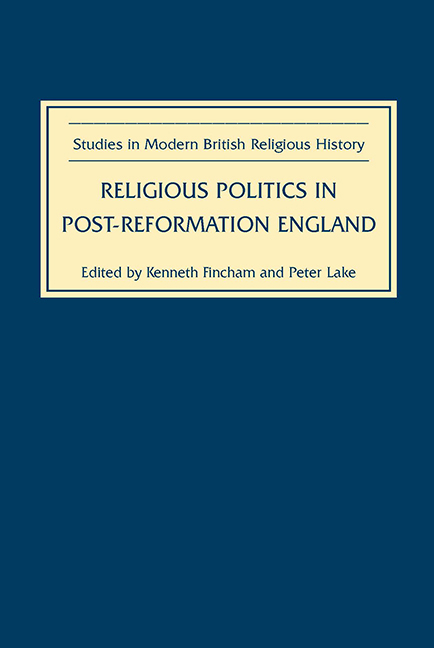Book contents
- Frontmatter
- CONTENTS
- Dedicaton
- Miscellaneous Frontmatter
- Preface
- Abbreviations
- 1 Introduction: Puritanism, Arminianism and Nicholas Tyacke
- 2 Art and Iconoclasm in Early Modern England
- 3 The Latitude of the Church of England
- 4 Joan of Contention: The Myth of the Female Pope in Early Modern England
- 5 Anti-Puritanism: The Structure of a Prejudice
- 6 The Fortunes of English Puritanism: An Elizabethan Perspective
- 7 What's in a Name? Dudley Fenner and the Peculiarities of Puritan Nomenclature
- 8 Puritan Preachers and their Patrons
- 9 New England's Reformation: ‘Wee shall be as a Citty upon a Hill, the Eies of All People are upon Us’
- 10 ‘Anglicanism’ by Stealth: The Career and Influence of John Overall
- 11 Destroyed for doing my Duty: Thomas Felton and the Penal Laws under Elizabeth and James I
- 12 Charles I and Providence
- 13 John Shawe and Edward Bowles: Civic Preachers at Peace and War
- 14 Material Evidence: The Religious Legacy of the Interregnum at St George Tombland, Norwich
- Index
- Tabula Gratulatoria
- Studies in Modern British Religious History
5 - Anti-Puritanism: The Structure of a Prejudice
Published online by Cambridge University Press: 25 October 2017
- Frontmatter
- CONTENTS
- Dedicaton
- Miscellaneous Frontmatter
- Preface
- Abbreviations
- 1 Introduction: Puritanism, Arminianism and Nicholas Tyacke
- 2 Art and Iconoclasm in Early Modern England
- 3 The Latitude of the Church of England
- 4 Joan of Contention: The Myth of the Female Pope in Early Modern England
- 5 Anti-Puritanism: The Structure of a Prejudice
- 6 The Fortunes of English Puritanism: An Elizabethan Perspective
- 7 What's in a Name? Dudley Fenner and the Peculiarities of Puritan Nomenclature
- 8 Puritan Preachers and their Patrons
- 9 New England's Reformation: ‘Wee shall be as a Citty upon a Hill, the Eies of All People are upon Us’
- 10 ‘Anglicanism’ by Stealth: The Career and Influence of John Overall
- 11 Destroyed for doing my Duty: Thomas Felton and the Penal Laws under Elizabeth and James I
- 12 Charles I and Providence
- 13 John Shawe and Edward Bowles: Civic Preachers at Peace and War
- 14 Material Evidence: The Religious Legacy of the Interregnum at St George Tombland, Norwich
- Index
- Tabula Gratulatoria
- Studies in Modern British Religious History
Summary
The title of this essay is, I must concede, flagrantly self-referential. It is designed to recall an earlier piece I wrote in the 1980s called ‘Anti-Popery: the Structure of a Prejudice’. That article was written when the predominant tendency was to explain the tensions that led up to the British civil wars through religious difference and conflict. On this view, religious principle or identity was conceived as an irreducible, and therefore largely inexplicable, aspect of early modern experience. Consequently ‘religion’ had merely to be traced running through the language and motivation of a range of contemporary individuals and groups, in order to explain what, in a political system devoid of major differences of political principle or secular ideology, and structured around the maintenance of ‘consensus’, was an otherwise inexplicable outbreak of conflict. On this account the English civil war was best regarded as ‘a war of religion’ and religious passion, operating at an irrational level of intensity, was the animating force behind the descent of the kingdom into war.
Thus conflict is here presented as a product of ‘religion’ rather than of ‘politics’, of misunderstanding and fear rather than of positive, self-consciously opposed ideological agendas. And in anti-popery, of course, there lay to hand a nexus of fears and priorities that led otherwise loyal and moderate Englishmen to conclude that their king was subject to the influence of popish evil counsellors to such an extent that civil war was not only a justifiable but a necessary expression of loyalty to the protestant state. As a number of scholars hastened to point out, the view of events produced by certain species of anti-popery did not accord with what historians (and indeed some contemporaries) themselves knew to be really happening. Neither Laud nor Charles were papists, and to claim that they were became therefore either an expression of irrational paranoia or a Machiavellian manoeuvre designed to exploit the fears and phobias of the populace in the political interests of the king's opponents in parliament. On this account, anti-popery was best seen as a cloud of unknowing, which descended on contemporaries at times of crisis and led them to misconstrue the real nature of events and thus to act in ways that they otherwise would never have attempted or even imagined.
- Type
- Chapter
- Information
- Religious Politics in Post-Reformation England , pp. 80 - 97Publisher: Boydell & BrewerPrint publication year: 2006



